九年级英语unit12知识点学习资料
人教版九年级英语unit12知识点归纳
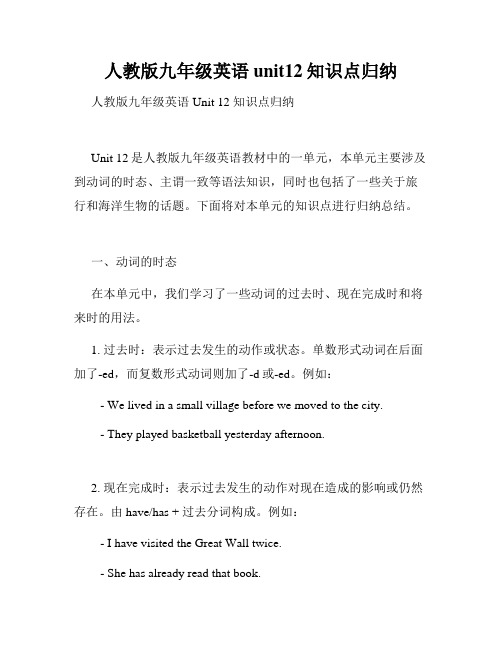
人教版九年级英语unit12知识点归纳人教版九年级英语Unit 12 知识点归纳Unit 12是人教版九年级英语教材中的一单元,本单元主要涉及到动词的时态、主谓一致等语法知识,同时也包括了一些关于旅行和海洋生物的话题。
下面将对本单元的知识点进行归纳总结。
一、动词的时态在本单元中,我们学习了一些动词的过去时、现在完成时和将来时的用法。
1. 过去时:表示过去发生的动作或状态。
单数形式动词在后面加了-ed,而复数形式动词则加了-d或-ed。
例如:- We lived in a small village before we moved to the city.- They played basketball yesterday afternoon.2. 现在完成时:表示过去发生的动作对现在造成的影响或仍然存在。
由have/has + 过去分词构成。
例如:- I have visited the Great Wall twice.- She has already read that book.3. 将来时:表示将来要发生的动作或存在的状态。
由will + 动词原形构成。
例如:- We will go to the beach tomorrow.- They will have a party next week.二、主谓一致主谓一致是指主语和谓语在人称和数上保持一致。
在本单元中,我们需要特别注意以下几点:1. 主语为第三人称单数时,谓语动词需要加-s或-es。
例如:- He often goes to the cinema on weekends.2. 表示时间、距离、金钱等的量词作主语时,谓语动词的单复数形式与它们代表的数量有关。
例如:- Ten yuan is enough to buy a drink.三、旅行话题在本单元中,我们学习了一些与旅行相关的词汇和句型,并通过对话的形式来进行实际应用。
九年级全一册英语unit12知识点
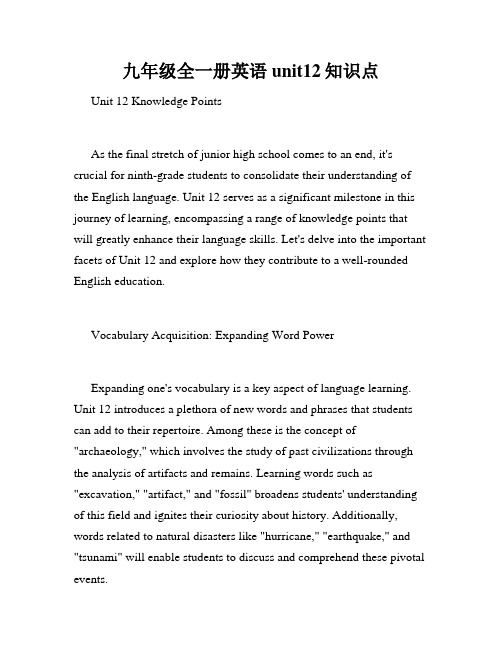
九年级全一册英语unit12知识点Unit 12 Knowledge PointsAs the final stretch of junior high school comes to an end, it's crucial for ninth-grade students to consolidate their understanding of the English language. Unit 12 serves as a significant milestone in this journey of learning, encompassing a range of knowledge points that will greatly enhance their language skills. Let's delve into the important facets of Unit 12 and explore how they contribute to a well-rounded English education.Vocabulary Acquisition: Expanding Word PowerExpanding one's vocabulary is a key aspect of language learning. Unit 12 introduces a plethora of new words and phrases that students can add to their repertoire. Among these is the concept of "archaeology," which involves the study of past civilizations through the analysis of artifacts and remains. Learning words such as "excavation," "artifact," and "fossil" broadens students' understanding of this field and ignites their curiosity about history. Additionally, words related to natural disasters like "hurricane," "earthquake," and "tsunami" will enable students to discuss and comprehend these pivotal events.Grammar: Complex Sentences and PunctuationUnit 12 delves into the realm of complex sentences, demonstrating how to combine multiple ideas and clauses to convey more nuanced meaning. By understanding how coordinating conjunctions like "and," "or," and "but" work, students can construct coherent sentences with ease. Moreover, accurate placement of punctuation marks, such as commas and semicolons, is vital for conveying meaning effectively. A thorough grasp of these grammar rules enhances students' writing and communication skills, enabling them to express their ideas more precisely.Reading Comprehension: Inferring MeaningThe unit also focuses on honing students' reading comprehension skills by introducing them to a variety of texts—from scientific articles to news reports. By providing opportunities for students to engage with authentic materials, Unit 12 trains them to infer meaning from context and make connections between different pieces of information. This not only fosters critical thinking but also strengthens their ability to extract essential details, supporting them in their future language acquisition and overall academic pursuits.Listening Skills: Capturing NuancesThe development of listening skills is crucial for effective communication. Unit 12 incorporates audio materials that challenge students to follow along with various accents and speech patterns. This exposure expands their ability to comprehend different intonations, recognize idiomatic expressions, and pick up on contextual cues. By training their ears to capture nuances within the language, students become well-rounded language users who can navigate diverse English-speaking environments with confidence.Writing and Speaking: Expressing Ideas FluentlyUnit 12 also emphasizes the importance of expressing ideas fluently in both written and spoken form. Writing tasks, such as composing newspaper articles or persuasive essays, encourage students to structure their thoughts coherently, develop arguments effectively, and employ appropriate vocabulary and grammar. Similarly, speaking activities foster communication skills, enabling students to articulate their ideas clearly, engage in discussions, and convey their viewpoints persuasively. These exercises strengthen their ability to expressthemselves eloquently, paving the way for success in future academic and professional endeavors.In conclusion, Unit 12 of the ninth-grade English curriculum offers a multifaceted approach to language learning. By expanding their vocabulary, mastering grammar rules, honing reading comprehension and listening skills, and developing writing and speaking fluency, students are equipped with the tools necessary to thrive in their language acquisition journey. These knowledge points not only enhance their English proficiency but also prepare them for the challenges and opportunities that lie ahead.。
英语第九年级12课知识点
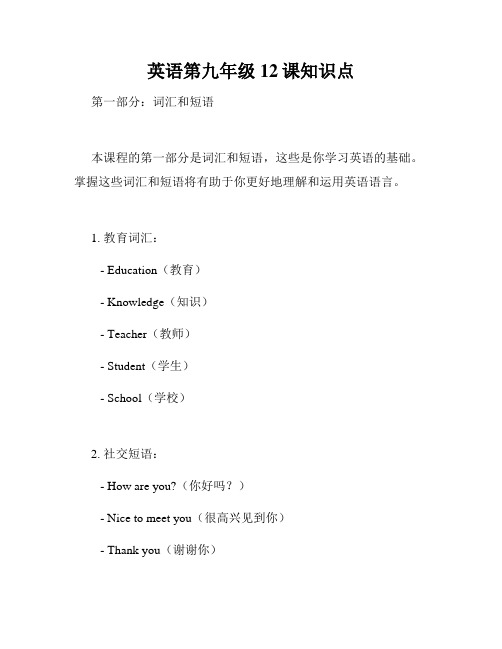
英语第九年级12课知识点第一部分:词汇和短语本课程的第一部分是词汇和短语,这些是你学习英语的基础。
掌握这些词汇和短语将有助于你更好地理解和运用英语语言。
1. 教育词汇:- Education(教育)- Knowledge(知识)- Teacher(教师)- Student(学生)- School(学校)2. 社交短语:- How are you?(你好吗?)- Nice to meet you(很高兴见到你)- Thank you(谢谢你)- You're welcome(不用谢)- Excuse me(请原谅我)第二部分:语法知识在学习英语时,语法是一个重要的组成部分。
了解和掌握不同的语法知识将有助于你正确地构建句子和表达自己。
1. 现在进行时:- 结构:主语 + am/is/are + 动词 + -ing- 例句:I am studying English.(我正在学习英语)2. 一般现在时:- 结构:主语 + 动词- 例句:He plays soccer every day.(他每天踢足球)3. 一般过去时:- 结构:主语 + 动词的过去式- 例句:She went to the park yesterday.(她昨天去了公园)第三部分:阅读理解和听力技巧为了提高你的英语技能,阅读理解和听力技巧是必不可少的。
下面是一些建议,帮助你更好地理解和运用英语。
1. 阅读理解技巧:- 仔细阅读问题和文章,确保你理解了问题的意思。
- 在阅读时标记重要的信息和关键词。
- 注意上下文推理,根据文章中的线索回答问题。
2. 听力技巧:- 提前阅读问题,了解你需要听到的关键信息。
- 注意听力材料中的关键词和短语。
- 练习听力,多听英语广播和音频材料。
第四部分:口语练习和写作技巧为了加强英语口语和写作能力,以下是一些建议和技巧。
1. 口语练习:- 多与其他学生或母语为英语的人进行对话练习。
- 使用学过的词汇和短语构建句子,并尝试进行简单的对话。
九年级人教版英语unit12知识点
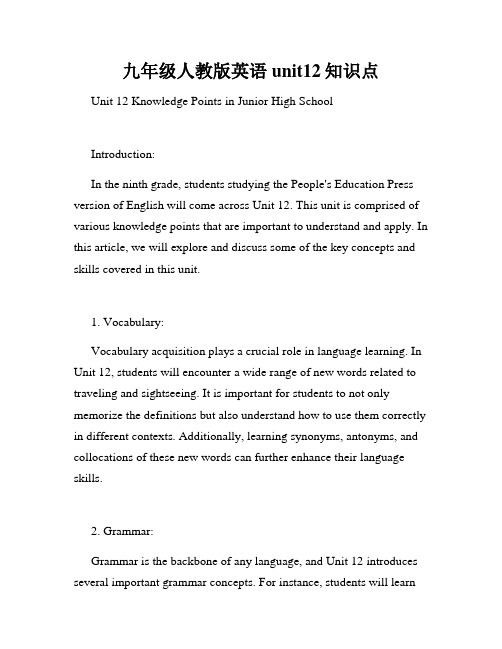
九年级人教版英语unit12知识点Unit 12 Knowledge Points in Junior High SchoolIntroduction:In the ninth grade, students studying the People's Education Press version of English will come across Unit 12. This unit is comprised of various knowledge points that are important to understand and apply. In this article, we will explore and discuss some of the key concepts and skills covered in this unit.1. Vocabulary:Vocabulary acquisition plays a crucial role in language learning. In Unit 12, students will encounter a wide range of new words related to traveling and sightseeing. It is important for students to not only memorize the definitions but also understand how to use them correctly in different contexts. Additionally, learning synonyms, antonyms, and collocations of these new words can further enhance their language skills.2. Grammar:Grammar is the backbone of any language, and Unit 12 introduces several important grammar concepts. For instance, students will learnabout reported speech, including the conversion of direct speech to indirect speech. They will also be introduced to the usage of modal verbs, such as should, could, and might, to express possibilities, obligations, and advice. It is essential for students to grasp these grammar rules and practice using them in sentences and conversations.3. Reading Comprehension:Unit 12 features various reading passages that revolve around the theme of travel and tourism. Reading comprehension exercises are designed to assess students' ability to understand the main idea, locate specific information, and infer meaning from context. To excel in this area, students should actively read, underline key points, and practice summarizing the main ideas of a text in their own words.4. Listening Comprehension:Listening skills are vital in language learning, especially for effective communication. In Unit 12, students will engage in listening activities that focus on different accents, speeds, and levels of difficulty. They will learn to identify specific details, infer meaning, and understand the flow of a conversation or lecture. Regular practice with listening exercises can greatly improve their comprehension skills.5. Speaking Skills:Unit 12 provides ample opportunities for students to develop their speaking skills. They will participate in various oral activities, such as role-plays, debates, and presentations. These activities aim to enhance their ability to express opinions, give explanations, and engage in discussions. By actively participating in class and practicing outside of school, students can become more confident and fluent speakers of English.6. Writing Skills:Writing is another crucial aspect of language learning, and Unit 12 covers different types of writing tasks. Students will learn how to write a report, a descriptive essay, and a travel brochure. They will be taught the importance of organizing their ideas logically, using appropriate vocabulary and grammar, and proofreading their work for errors. Regular writing practice, both in and out of the classroom, is essential for honing these skills.Conclusion:Unit 12 of the People's Education Press version of English for ninth-grade students contains a wealth of important knowledge points. From vocabulary and grammar to reading and listening comprehension, as well as speaking and writing skills, this unit encompasses a wide range of essential language abilities. By dedicating time and effort tomastering these knowledge points, students can significantly enhance their English proficiency and succeed in their language learning journey.。
英语九年级知识点12单元

英语九年级知识点12单元Unit 12: English Ninth Grade Knowledge PointsIntroduction:As students progress through their English studies, they reach Unit 12 in the ninth grade. This unit encompasses various essential knowledge points that will enhance their language skills further. In this article, we will delve into some of the significant aspects covered in this unit, discussing grammar, vocabulary, reading, and writing skills. Let's embark on this exciting journey through Unit 12!1. Grammar:Grammar plays a crucial role in effectively communicating in any language. In Unit 12, students encounter complex grammar concepts such as reported speech and conditionals. Reported speech involves transforming direct statements or questions into indirect speech, while conditionals deal with hypothetical or unreal situations. Mastering these grammar points enables students to express themselves accurately and convey information in different contexts.2. Vocabulary:Expanding one's vocabulary is essential for enhancing conversation skills and writing proficiency. In Unit 12, students encounter a wide range of vocabulary related to various themes like emotions, education, and social issues. By incorporating this newfound vocabulary into their everyday language, students can express their thoughts and ideas more precisely, thereby strengthening their communication abilities.3. Reading Skills:Developing reading skills is crucial for students to comprehend and analyze English texts effectively. Unit 12 introduces students to various reading passages that explore different genres such as fiction, non-fiction, and poetry. By reading and analyzing these texts, students enhance their comprehension, critical thinking, and interpretation skills. They also gain exposure to different writing styles, enabling them to develop their own unique voice in their future creative and academic writings.4. Writing Skills:Unit 12 also focuses on honing students' writing skills, allowing them to express their ideas and opinions concisely and coherently. Through imaginative and argumentative writing tasks, students learn to structure their essays effectively, use appropriate vocabulary, and employ persuasive techniques. Improving writing skills not onlyenhances one's academic performance but also enables effective communication in various personal and professional situations.5. Language Functions:Unit 12 also emphasizes the development of essential language functions, such as making suggestions, giving advice, and expressing opinions. These language functions empower students to participate actively in discussions, collaborate effectively with peers, and express their thoughts convincingly. By practicing these language functions, students become proficient in expressing themselves confidently, both orally and in writing.Conclusion:Unit 12 of the ninth-grade English curriculum comprises significant knowledge points that foster students' language skills. Through the study of grammar, vocabulary, reading, and writing skills, students enhance their ability to communicate accurately and fluently. Moreover, the improvement of language functions enables students to engage actively in discussions and express their thoughts convincingly. By acquiring these skills, students not only excel academically but also become effective communicators, ready to navigate a world that increasingly values language proficiency.。
九年级全一册英语Unit12知识点归纳
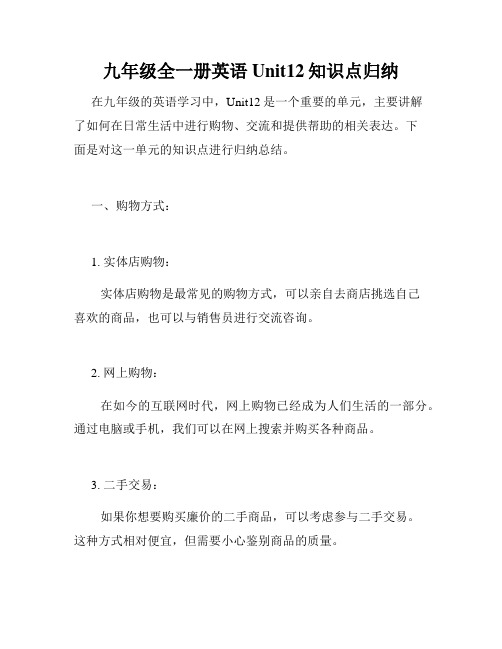
九年级全一册英语Unit12知识点归纳在九年级的英语学习中,Unit12是一个重要的单元,主要讲解了如何在日常生活中进行购物、交流和提供帮助的相关表达。
下面是对这一单元的知识点进行归纳总结。
一、购物方式:1. 实体店购物:实体店购物是最常见的购物方式,可以亲自去商店挑选自己喜欢的商品,也可以与销售员进行交流咨询。
2. 网上购物:在如今的互联网时代,网上购物已经成为人们生活的一部分。
通过电脑或手机,我们可以在网上搜索并购买各种商品。
3. 二手交易:如果你想要购买廉价的二手商品,可以考虑参与二手交易。
这种方式相对便宜,但需要小心鉴别商品的质量。
二、购物时的交流:1. 询问价格:如果你对某个商品感兴趣,可以使用以下表达方式询问价格: - How much is this/that?- How much does it cost?- What's the price?2. 购买商品:当你决定购买某个商品时,可以使用以下表达方式:- I'll take this/that one.- I want to buy this/that one.- I'd like to purchase this/that one.3. 比较商品:在购物时,我们常常需要比较不同商品的特点和价格。
以下表达方式可以帮助你进行比较:- Which one is cheaper, this one or that one?- What's the difference between this one and that one?- I think this one is better because...4. 付款方式:购物时,需要选择合适的付款方式。
以下是常见的付款方式: - Can I pay in cash?- Do you accept credit cards?- Can I use mobile payment like Alipay or WeChat Pay?5. 请求帮助:如果你在购物过程中遇到问题,可以用以下表达方式请求帮助:- Excuse me, can you help me?- Could you please assist me?- I need your help.三、购物中的礼貌用语:1. 感谢和道别:在购物过程中,我们要学会用礼貌的方式表达感谢和道别: - Thank you for your help.- Thanks a lot.- Have a nice day!2. 道歉和请求:如果我们在购物中犯了错或者需要别人帮助,要学会道歉和请求:- I'm sorry for the inconvenience.- Could you please help me with this?- I apologize for the mistake.四、购物时遇到的问题和解决办法:1. 商品不满意:如果购买的商品有质量问题或者与描述不符,可以进行退货或者换货:- I want to return this product because it's broken.- This item is not what I expected. Can I exchange it for another one?- Can I have a refund?2. 付款问题:在付款时可能会出现问题,可以寻求帮助解决:- I'm having trouble with the payment. Can you help me?- My credit card is not working. Is there another way to pay?- The payment machine is not giving me a receipt. What should I do?在Unit12的学习中,我们学到了购物的方式、交流技巧以及解决问题的方法,这些知识对我们日常的生活和未来的职业发展都具有重要意义。
九年级英语unit 12的知识点

九年级英语unit 12的知识点Unit 12: Knowledge Points in 9th Grade EnglishIn this unit, we will explore various knowledge points in 9th Grade English. These points are crucial to enhance our understanding and usage of the English language. Let's delve into these topics without further ado.1. Vocabulary Expansion:Expanding our vocabulary is essential to improving our English language skills. Here are some useful strategies to expand our vocabulary:- Reading extensively: Reading books, newspapers, and articles enables us to encounter new words in different contexts.- Creating word lists: Jotting down new words along with their meanings and example sentences helps us remember and review them later.- Using synonyms and antonyms: Identifying synonyms and antonyms for common words enhances our writing and speaking skills.- Learning word roots and affixes: Understanding word roots and common affixes helps us decipher the meanings of unfamiliar words.2. Grammar:Proper grammar usage is vital for effective communication. Let's review a few key grammar concepts:- Verb tenses: Understanding the different verb tenses, such as present, past, and future, allows us to express actions accurately in different time frames.- Subject-verb agreement: Ensuring the subject and verb agree in number and person helps maintain grammatical correctness.- Sentence structure: Mastering the use of subjects, predicates, phrases, and clauses enables us to construct clear and concise sentences.- Modifiers: Knowing how to correctly use adjectives and adverbs enhances the quality of our writing and adds precision to our descriptions.3. Reading Comprehension:Improving our reading comprehension skills is essential for understanding academic texts and gathering information effectively. Here are some strategies to enhance reading comprehension:- Skimming and scanning: Quickly going through the text to get a general idea (skimming) and searching for specific information (scanning) helps in efficient reading.- Identifying main ideas and supporting details: Recognizing the main idea and supporting details allows for a better understanding of the text's overall meaning.- Analyzing text structure: Paying attention to the structure of the passage, such as headings, subheadings, and paragraph organization, aids in understanding the content.- Making inferences: Drawing logical conclusions based on the information provided in the text helps us comprehend implicit meanings.4. Writing Skills:Developing strong writing skills enables us to express our thoughts and ideas clearly. Here are some areas to focus on:- Organizing ideas: Structuring our writing using paragraphs, topic sentences, and supporting details helps convey information effectively.- Using appropriate language and tone: Adapting the language and tone to suit the purpose and audience of our writing ensures clarity and coherence.- Editing and revising: Proofreading our written work for grammar, punctuation, and spelling errors, as well as revising content for clarity and coherence, is crucial for producing high-quality writing.- Incorporating varied sentence structures: Using a mix of simple, compound, and complex sentences adds variety to our writing and improves readability.5. Listening and Speaking Skills:Being able to listen and speak effectively enables successful communication in English. Here are some strategies to improve these skills:- Active listening: Paying attention to the speaker, taking notes, and asking questions for clarification enhances our listening comprehension.- Engaging in conversations: Practicing conversations with peers, teachers, or language partners helps improve fluency and confidence in speaking.- Pronunciation and intonation: Focusing on accurate pronunciation and intonation patterns allows for better understanding and effective communication.- Using supporting language: Using phrases like "Could you repeat that?" or "Can you give me an example?" helps in clarifying and expanding our understanding during conversations.In conclusion, mastering the knowledge points discussed in Unit 12 of 9th Grade English provides the foundation for successful language acquisition. By expanding our vocabulary, improving grammar usage, enhancing reading comprehension, developing writing skills, and sharpening listening and speaking abilities, we progress towards becoming proficient English speakers and writers.。
九年级英语unit 12重难点知识点

九年级英语unit 12重难点知识点Unit 12 in the 9th grade English curriculum covers various challenging topics. Let's delve into some of the key areas of focus in this unit.1. Vocabulary Enrichment:In this unit, students encounter a range of new words and phrases. It is essential to master these vocabulary words to better understand the reading passages and effectively communicate in English. To improve vocabulary retention, students can engage in activities such as word association, creating flashcards, and using the words in context through writing exercises.2. Idioms and Phrasal Verbs:Unit 12 introduces several idiomatic expressions and phrasal verbs, which can often be confusing for non-native English speakers. An idiom is a phrase or expression that has a figurative meaning different from its literal interpretation. For example, "to face the music" means to accept the consequences of one's actions. Phrasal verbs, on the other hand, are verb phrases composed of a verb and one or more particles (preposition or adverb). An example is "to give up," meaning to surrender or stop trying.3. Verb Tenses:Verbs play a crucial role in English grammar. Throughout Unit 12, verb tenses are emphasized. Students must understand the proper usage of different verb tenses, such as the present simple, present perfect, past simple, and past perfect. Practice exercises involving verb tenses and their application in various sentence structures will reinforce learning and improve accuracy.4. Modal Verbs:Unit 12 also covers modal verbs, which are used to express ability, possibility, permission, and obligation. Common modal verbs include "can," "could," "may," "might," "must," "shall," "should," "will," "would," and "ought to." Understanding when and how to use these modal verbs correctly is crucial to construct meaningful sentences and convey the intended message accurately.5. Conditional Sentences:Conditional sentences express hypothetical situations and their potential consequences. They consist of an "if" clause and a main clause. Unit 12 introduces different types of conditionals, such as the zero conditional, the first conditional, the second conditional, and the third conditional. Each conditional form serves a specific purpose andunderstanding their usage will enable students to effectively communicate possibilities, probabilities, and counterfactual situations.6. Reading Comprehension:Unit 12 includes reading passages that test students' comprehension skills. These texts cover a wide range of topics, from scientific discoveries to historical events. Students must develop strategies to comprehend the main ideas, infer meanings from context, extract details, and make logical connections within the text. Active reading techniques such as highlighting, underlining, and summarizing can be beneficial in improving reading comprehension.7. Writing Skills:In the writing component of Unit 12, students are encouraged to enhance their skills in organizing and expressing ideas. Students should practice writing different types of essays, including descriptive, narrative, and argumentative essays. Emphasis should be placed on developing a coherent structure with relevant supporting details, using appropriate vocabulary and grammar, and editing for clarity and conciseness.As students progress through the unit, focusing on these key areas will help them gain a deeper understanding of the English language.Continuous practice, both in and outside the classroom, is essential for students to consolidate their knowledge and improve their English proficiency. Remember, perseverance and consistent effort are the keys to success in mastering English skills.。
九年级英语Unit12知识点

九年级英语Unit12《Life is full of the unexpected.》知识点【短语归纳】1. take a shower洗浴2. leave my backpack at home 把背包忘在家里3. get back to school 返回学校4. start teaching 开始教学5. go off 响铃6. rush out the door 冲出房门7. give sb a lift 捎某人一程8. miss both events 错过两个事件9. full of unexpected 充满着不可预知性10. be about to do sth 正要做某事11. stare in disbelief at 难以置信地盯着。
12. raise above the burning building从正在燃烧的楼上升起13. jump out of bed 跳下床14. collect the math homework 收数学作业15. complete the work for my boss 完成老板的工作16. make the apple pie 制作苹果馅饼17. show up 赶到,出现18. add the green beans 加绿豆荚【重点句子】1. By the time I got up, my brother had already gotten in the shower.当我起床时,我哥哥已经进了浴室了。
2. By the time I got outside, the bus had already gone. 当我出来时,公汽已经走了。
3. When I got to school, I realized I had left my backpack at home.当我到达学校时,我才意识到我把背包忘在家里了。
4. By the time I walked into class, the teacher had started teaching already.当我走进教室时,老师已经开始讲课了。
初中九年级英语Unit 12知识点资料汇总
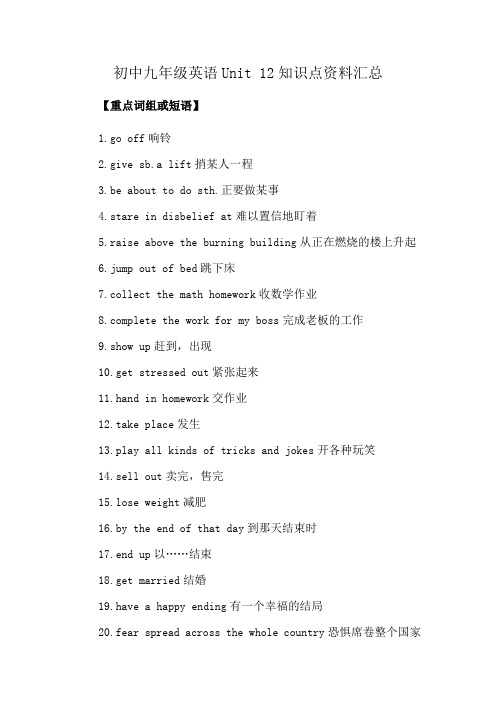
初中九年级英语Unit 12知识点资料汇总【重点词组或短语】1.go off响铃2.give sb.a lift捎某人一程3.be about to do sth.正要做某事4.stare in disbelief at难以置信地盯着5.raise above the burning building从正在燃烧的楼上升起6.jump out of bed跳下床7.collect the math homework收数学作业plete the work for my boss完成老板的工作9.show up赶到,出现10.get stressed out紧张起来11.hand in homework交作业12.take place发生13.play all kinds of tricks and jokes开各种玩笑14.sell out卖完,售完15.lose weight减肥16.by the end of that day到那天结束时17.end up以……结束18.get married结婚19.have a happy ending有一个幸福的结局20.fear spread across the whole country恐惧席卷整个国家21.head west向西前进22.in the middle of the road在路中间23.turn around调头、转身24.make an unexpected discovery有一个出人乎意料的发现25.cancel the plan取消计划26.lead to通向27.miss doing sth.错过做某事【重难点句子】1.I was about to go up when I decided to get a coffee first.我正准备上去,这时决定先喝一杯咖啡。
2.As I was waiting in line with other office workers,I hearda loud sound.正当我和其他办公室员工在排队等候时,我听到了一声巨响。
九年级全一册unit12知识点

九年级全一册unit12知识点九年级全一册Unit 12知识点随着学习的不断深入,九年级学生们接触到了更加复杂和抽象的知识内容。
Unit 12是全一册中的最后一个单元,也是一个重要且关键的阶段。
在这个单元中,学生们将学习一些新的知识点和技能,为进一步提高他们的学习能力奠定基础。
一、动词时态的复习与运用在Unit 12中,学生们将复习并运用动词时态。
动词时态是指动作或状态发生的时间。
英语中有许多时态,包括过去时、现在时和将来时等。
通过语境和语法规则,学生们可以正确地使用各种时态来表达自己的想法和过去、现在、将来的事情。
例如,在Unit 12中有一个语法任务是填充动词填空,要求学生们根据句子的时态填入正确的动词形式。
通过这样的任务,学生们可以加深对动词时态的理解,并熟练地运用到实际的语言表达中。
二、语法规则的运用与记忆策略Unit 12还包括其他重要的语法知识点,例如条件状语从句和比较级和最高级等。
条件状语从句用来表达一个假设情况下的结果,比较级和最高级则用来比较两个或多个事物的程度或大小。
对于这些语法规则,学生们需要在课堂上进行充分的理解和练习,还可以通过记忆策略来帮助自己更好地掌握。
例如,对于条件状语从句,学生们可以记住以下句型:If + 条件句,主句。
通过课堂练习,他们可以分析句子结构并理解条件状语从句中的语法规则。
同时,通过多读和多写,加深对这个语法知识点的记忆和运用。
三、写作技巧的提高在Unit 12中,学生们将有机会运用所学的知识点,尤其是动词时态和语法规则,来提高他们的写作能力。
写作是一项重要的语言交流技能,通过写作,学生们可以表达自己的观点和想法,并提升自己的表达能力。
在写作方面,学生们可以通过以下几个方面来提高自己的能力:1. 扩大词汇量:学生们可以通过背单词、读英语文章等方式来扩大自己的词汇量。
在写作中使用更多的词汇,可以使文章更加丰富、生动。
2. 练习语法:语法是写作的基础,学生们需要熟练地运用语法规则来构建句子和表达意思。
人教版九年级全一册英语Unit12单元语法知识点总结
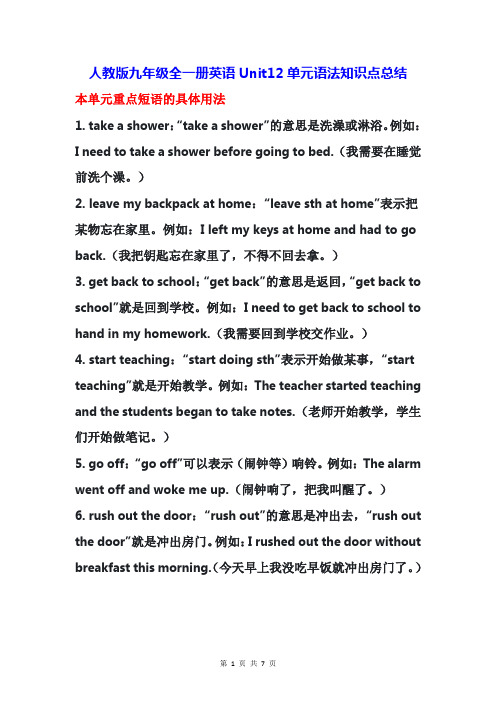
人教版九年级全一册英语Unit12单元语法知识点总结本单元重点短语的具体用法1. take a shower:“take a shower”的意思是洗澡或淋浴。
例如:I need to take a shower before going to bed.(我需要在睡觉前洗个澡。
)2. leave my backpack at home:“leave sth at home”表示把某物忘在家里。
例如:I left my keys at home and had to go back.(我把钥匙忘在家里了,不得不回去拿。
)3. get back to school:“get back”的意思是返回,“get back to school”就是回到学校。
例如:I need to get back to school to hand in my homework.(我需要回到学校交作业。
)4. start teaching:“start doing sth”表示开始做某事,“start teaching”就是开始教学。
例如:The teacher started teaching and the students began to take notes.(老师开始教学,学生们开始做笔记。
)5. go off:“go off”可以表示(闹钟等)响铃。
例如:The alarm went off and woke me up.(闹钟响了,把我叫醒了。
)6. rush out the door:“rush out”的意思是冲出去,“rush out the door”就是冲出房门。
例如:I rushed out the door without breakfast this morning.(今天早上我没吃早饭就冲出房门了。
)7. give sb a lift:“give sb a lift”的意思是让某人搭车、捎某人一程。
人教版九年级unit12知识点

人教版九年级unit12知识点人教版九年级Unit 12知识点Unit 12: Can you be my Chinese pen friend?本单元主要围绕学生是否能够成为彼此的笔友展开,涉及到信件写作、文化交流等方面的知识。
以下是本单元的重点内容。
一、词汇与短语1. pen friend:笔友2. introduce:介绍3. communicate:交流4. foreign:外国的5. country:国家6. habit:习惯7. similar:相似的8. different:不同的9. respect:尊重10. traditional:传统的二、语法与句型1. 一般现在时:常用于描述现在情况或日常习惯,如:I live in China.(我住在中国。
)2. there be句型:用于描述某地有某物或某人。
如:There is a park near my house.(在我家附近有个公园。
)3. 直接引语与间接引语:直接引语是直接引述他人的话语,用引号标注;间接引语是对他人说话的间接转述,不使用引号。
如:He said, "I love playing soccer."(他说:“我喜欢踢足球。
”)→He said that he loved playing soccer.(他说他喜欢踢足球。
)三、重点句子1. Can you introduce yourself?(你能介绍一下自己吗?) - Yes, of course. My name is Tom. I'm from the United States.(是的,当然可以。
我的名字叫汤姆。
我来自美国。
)2. What's your daily routine? (你的日常作息是怎样的?)- I usually get up at 7 o'clock in the morning and have breakfast at 7:30.(我通常早上7点起床,7点半吃早饭。
Unit12重点知识人教版九年级英语全册
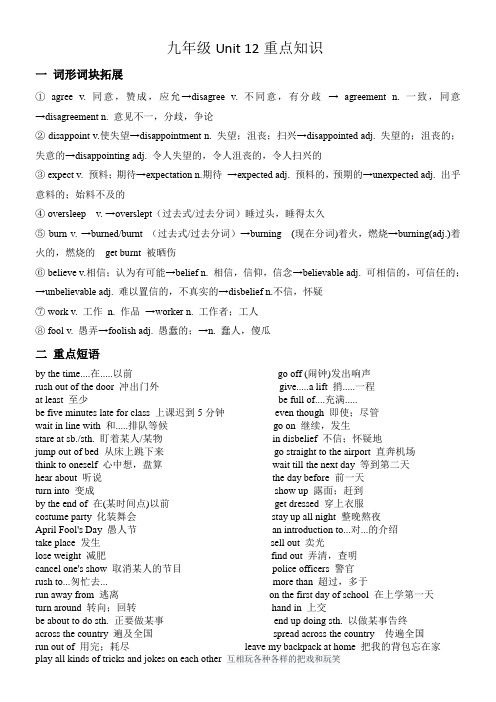
九年级Unit 12重点知识一词形词块拓展①agree v. 同意,赞成,应允→disagree v. 不同意,有分歧→ agreement n. 一致,同意→disagreement n. 意见不一,分歧,争论② disappoint v.使失望→disappointment n. 失望;沮丧;扫兴→disappointed adj. 失望的;沮丧的;失意的→disappointing adj. 令人失望的,令人沮丧的,令人扫兴的③ expect v. 预料;期待→expectation n.期待→expected adj. 预料的,预期的→unexpected adj. 出乎意料的;始料不及的④ oversleep v. →overslept(过去式/过去分词)睡过头,睡得太久⑤ burn v. →burned/burnt (过去式/过去分词)→burning (现在分词)着火,燃烧→burning(adj.)着火的,燃烧的get burnt 被晒伤⑥ believe v.相信;认为有可能→belief n. 相信,信仰,信念→believable adj. 可相信的,可信任的;→unbelievable adj. 难以置信的,不真实的→disbelief n.不信,怀疑⑦ work v. 工作n. 作品→worker n. 工作者;工人⑧ fool v. 愚弄→foolish adj. 愚蠢的;→n. 蠢人,傻瓜二重点短语by the time....在.....以前go off (闹钟)发出响声rush out of the door 冲出门外give.....a lift 捎.....一程at least 至少be full of....充满.....be five minutes late for class 上课迟到5分钟even though 即使;尽管wait in line with 和.....排队等候go on 继续,发生stare at sb./sth. 盯着某人/某物in disbelief 不信;怀疑地jump out of bed 从床上跳下来go straight to the airport 直奔机场think to oneself 心中想,盘算wait till the next day 等到第二天hear about 听说the day before 前一天turn into 变成show up 露面;赶到by the end of 在(某时间点)以前get dressed 穿上衣服costume party 化装舞会stay up all night 整晚熬夜April Fool's Day 愚人节an introduction to...对...的介绍take place 发生sell out 卖光lose weight 减肥find out 弄清,查明cancel one's show 取消某人的节目police officers 警官rush to...匆忙去... more than 超过,多于run away from 逃离on the first day of school 在上学第一天turn around 转向;回转hand in 上交be about to do sth. 正要做某事end up doing sth. 以做某事告终across the country 遍及全国spread across the country 传遍全国run out of 用完;耗尽leave my backpack at home 把我的背包忘在家play all kinds of tricks and jokes on each other 互相玩各种各样的把戏和玩笑三.Grammar过去完成时1.When I got to school, I realized I had left my backpack at home.2.By the time I got back to school, the bell had rung.3.But before I got to the bus stop, the bus had already left.Summary:1)意义:过去完成时表示过去某个时间或某个动作____发生的动作,它表示动作发生的时间是“________________”,它是一种相对于___________的时态,没有_________________就没有过去完成时态。
人教版英语九年级全册 Unit 12 知识精讲

人教版英语九年级全册Unit 12知识精讲Unit 12 Life is full of the unexpected.Section A1. By the time I got up, my brother had already gotten in the shower. 在我起床之前,我的兄弟已经在洗澡了。
本句为过去完成时态,表示在过去某一时间或动作之前已经发生或完成了的动作,即“过去的过去”。
构成:过去完成时由“助动词had + 过去分词”构成,其中had 通用于各种人称。
They had already had breakfast before they arrived at the hotel.与过去完成时连用的时间状语有:( 1 )by + 过去的时间点。
如:I had finished reading the novel by nine o'clock last night.( 2 )by the end of + 过去的时间点。
如:We had learned over two thousand English words by the end of last term.( 3 )before + 过去的时间点。
如:They had planted six hundred trees before last Wednesday.例:—We all went to the cinema except you last night. Why didn't you come?—Because I ______ that movie twice.A. have watchedB. had watchedC. was watchingD. would watch答案:B【解析】考查过去完成时的用法。
根据上下文可知:我昨晚不去看电影,是因为我以前看过了。
叙述的是“过去的过去”发生的事,故用过去完成时态,选B项。
九年级英unit12知识点
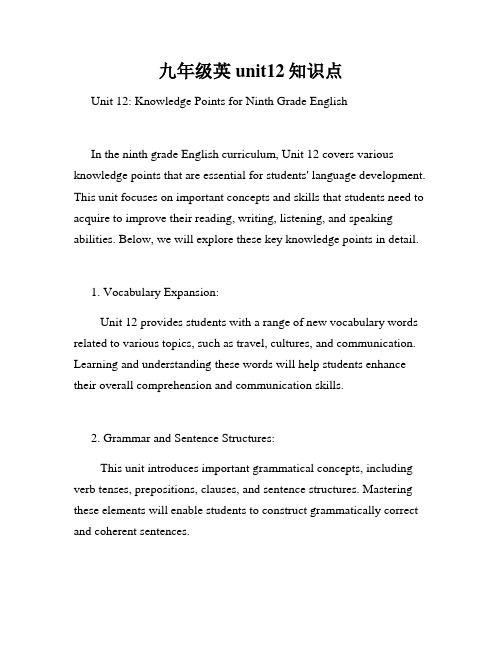
九年级英unit12知识点Unit 12: Knowledge Points for Ninth Grade EnglishIn the ninth grade English curriculum, Unit 12 covers various knowledge points that are essential for students' language development. This unit focuses on important concepts and skills that students need to acquire to improve their reading, writing, listening, and speaking abilities. Below, we will explore these key knowledge points in detail.1. Vocabulary Expansion:Unit 12 provides students with a range of new vocabulary words related to various topics, such as travel, cultures, and communication. Learning and understanding these words will help students enhance their overall comprehension and communication skills.2. Grammar and Sentence Structures:This unit introduces important grammatical concepts, including verb tenses, prepositions, clauses, and sentence structures. Mastering these elements will enable students to construct grammatically correct and coherent sentences.3. Reading Comprehension:Unit 12 offers a selection of interesting texts that challenge students' reading comprehension skills. The texts cover a wide range of genres, such as short stories, newspaper articles, and informational texts. By analyzing and understanding these texts, students will develop their reading abilities and expand their knowledge on various subjects.4. Writing Skills:In this unit, students have the opportunity to practice their writing skills by producing different types of written pieces, such as essays, letters, and reports. They will learn how to structure their writing effectively, organize ideas, and express their thoughts in a clear and coherent manner.5. Listening and Speaking Practice:Unit 12 includes various listening exercises and opportunities for students to engage in oral communication. These activities aim to improve students' listening comprehension skills and enhance their ability to express themselves fluently and accurately in spoken English.6. Cultural Awareness:Throughout Unit 12, students are exposed to different cultures and traditions through the texts and listening materials. They will gain a deeper understanding and appreciation for cultural diversity, enhancing their global awareness and fostering their ability to communicate and interact effectively with people from various backgrounds.7. Test Preparation:Unit 12 provides practice exercises and assessments that simulate the types of questions and tasks students may encounter in English exams. This preparation helps students become familiar with the test format and develop strategies to perform well in assessments.In conclusion, Unit 12 of the ninth grade English curriculum offers a comprehensive range of knowledge points essential for students' English language development. Through vocabulary expansion, grammar practice, reading comprehension exercises, writing activities, listening and speaking practice, cultural awareness, and test preparation, students can enhance their overall English proficiency and become effective communicators.。
人教版九年级英语unit 12知识点
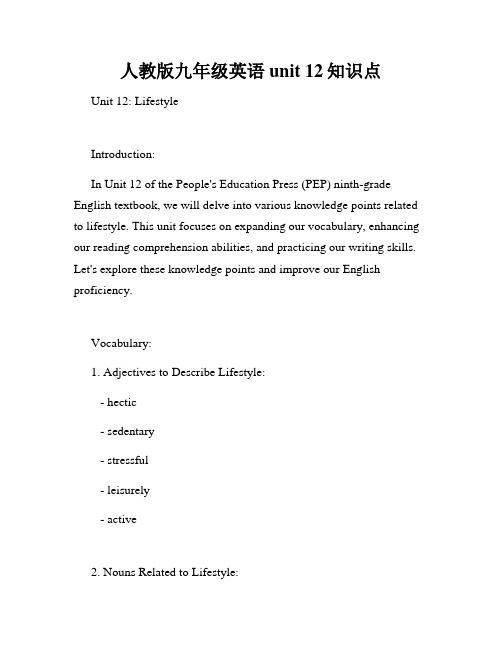
人教版九年级英语unit 12知识点Unit 12: LifestyleIntroduction:In Unit 12 of the People's Education Press (PEP) ninth-grade English textbook, we will delve into various knowledge points related to lifestyle. This unit focuses on expanding our vocabulary, enhancing our reading comprehension abilities, and practicing our writing skills. Let's explore these knowledge points and improve our English proficiency.Vocabulary:1. Adjectives to Describe Lifestyle:- hectic- sedentary- stressful- leisurely- active2. Nouns Related to Lifestyle:- routine- balance- diet- exercise- habit3. Phrases and Expressions:- live a healthy lifestyle- take up a hobby- maintain a work-life balance- lead an active life- stick to a dietReading Comprehension:In this section, we will practice our reading skills by exploring various passages related to lifestyle. These passages may cover topics such as time management, physical health, mental well-being, and interpersonal relationships. Through reading, we can comprehend the main ideas, identify supporting details, and infer the author's purpose.Writing Skills:In Unit 12, we will also engage in developing our writing skills through various exercises. Some of the writing tasks may include:1. Writing a Diary Entry:Imagine you have adopted a new hobby recently. Write a diary entry describing how this hobby has positively impacted your lifestyle.2. Describing a Healthy Routine:Write a paragraph or short essay describing your daily routine and how you ensure a healthy lifestyle despite a busy schedule.3. Giving Advice:Write a letter to a friend who is struggling to maintain a work-life balance. Offer advice and share personal experiences to help them improve their lifestyle.4. Reflective Essay:Write a reflective essay sharing your thoughts on the importance of a balanced lifestyle. Discuss how it affects your overall well-being and personal growth.Conclusion:Unit 12 of the People's Education Press ninth-grade English textbook provides us with valuable knowledge points related to lifestyle. Through expanding our vocabulary, improving reading skills, and practicing writing, we can enhance our English proficiency. By understanding and incorporating these lifestyle concepts into our daily lives, we can lead healthier, more fulfilling lifestyles. Let's embrace these knowledge points and continue to grow our language abilities.。
- 1、下载文档前请自行甄别文档内容的完整性,平台不提供额外的编辑、内容补充、找答案等附加服务。
- 2、"仅部分预览"的文档,不可在线预览部分如存在完整性等问题,可反馈申请退款(可完整预览的文档不适用该条件!)。
- 3、如文档侵犯您的权益,请联系客服反馈,我们会尽快为您处理(人工客服工作时间:9:00-18:30)。
九年级英语Unit12《Life is full of the unexpected.》知识点本单元语法:过去完成时。
过去完成时表示在过去某一时间点以前即“过去的过去”已经发生的动作。
Mr. Black told me that he had seen the movie three times.⑴过去完成时表示在过去某一时间或动作之前已经发生或完成的动作。
它表示动作发生的时间是“过去的过去”。
⑵过去完成时的结构是:肯定由“助动词had(用于各种人称和数) + 过去分词”构成否定式:had not + 过去分词缩写形式:hadn’t⑶过去完成时的时间状语:①表示过去某一时间可用by, before等构成的短语。
by the time by the end ofWe had finished our homework before 10 o’clock.②可能通过when, before等引导的从句表示。
When I got there, the train had left.③过去某一时间通过上下文来表示。
Kate hadn’t studied hard, so she didn’t pass the exam yesterday.1. unexpected adj. 出乎意料的;始料不及的expect v. expect/wish sb. to do sth.期盼某人做某事the unexpected “意外的事情”“出乎意料的事”。
the +adj.表示一类人或事物。
the homeless (无家可归者) the disabled(残疾人)the wounded(战争中受伤的人) the injured(事故中受伤的人)2.by the time+时间状语从句(1)时间状语从句的时态是一般现在时时(表示将来),主句用将来完成时;(2)时间状语从句是一般过去式时,主句用过去完成时。
by the end of +时间点(1)+过去的时间点,主句用过去完成时;(2)+将来的时间点,主句用将来完成时;by+时间点(1)+现在的时间点,主句用现在完成时;(2)+过去的时间点,主句用过去完成时;(3)+将来的时间点,主句用将来完成时。
By the time you came back, I had finished this book.By the time Jane gets home, her aunt will have left for Beijing.By the end of last year, I had stayed in Xinzheng for seven years.By now, I have finished all my homework.3.oversleep =sleep late v 睡过头sleep → slept → slept oversleep—overslept—overslept–What happened ? — I _____.A. oversleepB. oversleepedC. overslept4. give sb. a lift =give sb. a ride / give a rid e to sb. “捎某人一程”,The poor old woman was standing in the middle of the road and asked someone to ___.A. give him a rideB. give her a rideC. enjoy a rideD. accept a ride5.leave 与forget的用法:(1) leave “ 遗留,落下,忘记带”,侧重指把某物或某人留在某个地方,后常跟地点状语;(2)forget “ 忘记”,侧重指忘记某件事情,后常跟to do (忘了要去做)或doing (忘了做过)。
remember todo remember doing♦leave → left → left v 离开(1)leave sth +地点把某物遗忘在某地(2)leave for +地点(目的地) 离开去某地(3) leave a message 留言ask for leave 请假leave school (中学) 毕业(4)leave one by oneself=leave sb. alone 把某人单独留下6.when的特殊用法“这时,突然”,用于四种结构1)be doing sth...whenI was thinking of this when I heard my name called.2)be on the point of doing sth...whenShe was on the point of going out when the telephone rang3)be about to do sth...when We were about to start when it began to rain.4).sb. had hardly/scarcely/barely done sth... whenWe had hardly fallen asleep when the bell rang.另:be about to 忙于;即将做某事。
侧重于表示动作马上就要发生,常与when引导的从句连用,但不与具体的时间状语连用。
7.be full of = be filled with充满,装满fill…with..The basket is full of apples. = The basket is filled with apples.8.get/go/come/be back to school=return to school意为“回到学校”1)get back to 后接表地点的名词,意为“回到某地”;2)get back to 后面接人,可引申为“回复某人的信件,电子邮件,电话”等;3)get back 还可表示“ 回来,返回,拿回,取回”等含义。
4)give back=return归还9.My alarm clock didn’t go off!go off 发出响声, (闹钟)闹响The alarm went off just now.go over 复习go away 离开go by (时间)过去go for a walk 出去散步go on 继续go + doing 去做某事go fishing/shopping/skating/swimming去钓鱼/去买东西/去溜冰/去游泳10.rush out 冲出去,冲出…… wait in line w ith 意为“与……排队等候”stand in line 站成一排cut in line 插队stare at 凝视in disbelief 不相信turn/change into 变land on 意为“着陆;降落于”be late for迟到keep doing sth 一直做......wake up 醒来wake-woke-woken11.even if / even though/ though/although 都可以引导让步状语从句。
Even if =even though“即使、纵然”引出的从句叙述的是假设或把握很大的事情though“虽然”,引出的从句叙述的是事实。
I will try even if I may fail.Though it was very late, he went on working.[注] though 和but 不能同时出现在句中。
12.above1)prep(表示位置)在…正上方;(与below相对)The moon is now above the trees.2)prep表示在地位、级别、能力、资历、重要性等方面“超过”He is above me in every way.3) adv. “在上面; 在上文”。
See the examples given above.2000 meters above the sea level 海拔2000米13.alive, living, live与livelylively1)live “活着的”,通常指物,不指人,常用来作定语放名词的前面。
还指“实况转播的”。
例如:a live fish 一条活鱼。
Do you like a live show or a recorded show ?2)living意为“活着”强调说明“尚在人间”,“健在”,可用来指人或物,作定语或表语。
例如:.My first teacher is still living . English is a living language .A living language should be learned through listening and speaking .He is regarded as one of the best living writers at present .注意:living 前加上the , 表示类别,指“活着的人们”。
例如:The living must finish the work of those dead .living 还可用于短语,例如:make a living by doing谋生。
3)alive 意为“活着”,侧重说明生与死之间的界限(本来会死但没有死),既可指人,也可指物;可用来作表语,后置定语或宾补。
例如:He is dead , but his dog is still alive .He wanted to keep the fish alive.This is a fish alive.4)lively 则意为“活泼的”,“活跃”,“充满生气的”,可作定语、表语或宾补,既可指人,又可指物。
例如:Jenny is a lively girl . Everything is lively here . 这儿一切都生机勃勃。
He had a strange way of making his classes lively and interesting .live 物定语现场的living 人/物定语、表语 Make a living/the livingalive 人/物后置定语、表语、宾补生与死的界限lively 人/物定语、表语、宾补生气勃勃的,无活着的意思1). Jin Yong is one of the greatest and oldest writer. He is still .A. living; aliveB. living; livingC. alive; livingD. alive; lively2).—Is his grandmother still ?—Yes, she is 102 years old!A. liveB. livingC. aliveD. Lively14.take off 在此句中意为“起飞”,off 在此为副词表示“离开;走开”。
